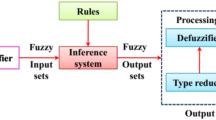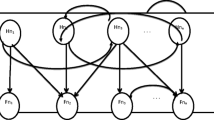Abstract
Optimization of energy consumption in the batteries of a sensor node plays an essential role in wireless Sensor networks (WSNs). The longevity of sensor nodes depends on efficiency of energy utilization in batteries. Energy is consumed by sensor nodes in WSNs to perform three significant functions namely data sensing, transmitting and relaying. The battery energy in WSNs depletes mainly due to sampling rate and transmission rate. In the present work, the most important parameters affecting the longevity of network are indentified by modeling the energy consumption. The parameters are expressed as a fuzzy membership function of variables affecting the life time of network. Fuzzy logic is used at multiple levels to optimize the parameters. Network simulator-2 is used for experimentation purpose. The proposed work is also compared with the existing routing protocols like Enhanced Low Duty Cycle, Threshold Sensitive Energy Efficient Sensor Network and Distributed Energy Efficient Adaptive Clustering Protocol with Data Gathering. The proposed solution is found to be more energy efficient and hence ensures longer network lifetime.


















Similar content being viewed by others
References
Raghavendra, S., Cauligi, S., Sivalingam, K. M., & Znati, T. (2006). Wireless sensor networks. Berlin: Springer.
Dargie, W., & Poellabauer, C. (2010). Fundamentals of wireless sensor networks theory and practice. Berlin: Wiley.
Rani, S., Malhotra, J., & Talwar, R. (2013). EEICCP-energy efficient protocol for wireless sensor networks. Wireless Sensor Networks, 5(7), 127–136.
Nikolidakis, S. A., Vergados, D. D., & Douligeris, C. (2013). Energy efficient routing in wireless sensor networks through balanced clustering. Algorithms, 6, 29–42.
Vu, T. T., Nguyen, V. D., & Nguyen, H. M. (2014). An energy-aware routing protocol for wireless sensor networks based on K-means clustering. Recent Advances in Electrical Engineering and Related Sciences Lecture Notes in Electrical Engineering, 282, 297–306.
Khan, Z. A., Sivakumara, S., Phillips, W., & Robertson, B. (2013). A QOS-aware routing protocols for reliability sensitive data in hospital body area networks. In Trans. on ELSEVIER in proc. ANT (pp. 171–179).
Velasquez-Villada, C., & Donoso, Y. (2013). Multipath routing network management protocol for resilient and energy efficient wireless sensor networks. In Trans. on ELSEVIER in proc. ITQM (pp. 387–394).
Ahvar, E., Ahvar, S., Lee, G. M., & Crespi, N. (2014). An energy-aware routing protocol for query-based applications in wireless sensor networks. In Wireless Networks and Multimedia Services Department”, Institut Mines-Telecom Telecom SudParis, The Scientific World Journal (Vol. 9).
Monowar, M. M. (2017). An energy-aware multi- constrained localized QoS routing for industrial wireless sensor networks. Adhoc & Sensor Wireless Networks, 36(1–4), 21–50.
Mehmood, A., Lv, Z., Lloret, J., & Umar, M. M. (2017). ELDC: an artificial neural network based energy- efficient and robust routing scheme for pollution monitoring in WSNs. IEEE Transactions on Emerging Topics in Computing, 99, 1.
Manjeshwar, A., & Agrawal, D. (2001). TEEN: A routing protocol for Enhanced Efficiency in Wireless Sensor Networks, In Proceedings of 15th international parallel and distributed processing symposium (IPDPS’01) workshops, USA, California (pp. 2009–2015).
Brar, G. S., Rani, S., Song, H., & Ahmed, S. H. (2016). Energy efficient direction-based PDORP routing protocol for WSN. IEEE Special Section on Green Communications and Networking for 5g Wireless, 4, 3182–3194.
Chirihane, G., & Zibouda, A. (2015). Distributed energy efficient adaptive clustering protocol with data gathering for large-scale wireless sensor networks. In Programming and systems (ISPS), 12th international conference, IEEE.
Khodabandeh, H., Ayatollahitafti, V., & Taghizadeh, M. S. (2017). Link aware and energy efficient routing algorithm in wireless body area networks. Network Protocols and Algorithms, 9(1–2), 126–138.
Kim, K. T., & Youn, H. Y. (2015). An energy- efficient and scalable routing protocol for distributed wireless sensor networks. Adhoc & Sensor Wireless Networks, 29(1–4), 195–212.
Kandukuri, S., Lebreton, J., Lorion, R., Murad, N., & Lan-Sun-Luk, J. D. (2016). Energy-efficient data aggregation techniques for exploiting spatio- temporal correlations in wireless sensor networks. In 2016 wireless telecommunications symposium (WTS), London, (pp. 1–6).
Kandukuri, S., Murad, N., & Lorion, R. (2015). A single- hop clustering and energy efficient protocol for wireless sensor networks. In IEEE Radio and Antenna Days of the Indian ocean ` (RADIO) (pp. 1–2).
Kumar, T., Pandey, B., Das, T., & Chowdhry, B. S. (2014). Mobile DDR IO standard based high performance energy efficient portable ALU design on FPGA. Wireless Personal Communications, 76, 569–578.
Jain, A., & Goel, A. K. (2019). Energy efficient fuzzy routing protocol for wireless sensor networks. Wireless Personal Communications, 110, 1459.
Younus, M. U. (2018). Analysis of the impact of different parameter settings on wireless sensor network lifetime. International Journal of Advanced Computer Science and Applications, 9(3), 16–21.
Nayak, Padmalaya, & Vathasavai, Bhavani. (2017). Energy efficient clustering algorithm for multi-hop wireless sensor network using type-2 fuzzy logic. IEEE Sensors Journal, 17, 4492–4499.
Bhangwar, A. R., et al. (2019). WETRP: Weight based energy & temperature aware routing protocol for wireless body sensor networks. IEEE Access, 7, 87987–87995.
Acknowledgements
I would like to sincerely thank my guide Dr. U.B. Mahadevaswamy for his constant support to write this research paper. This research was supported in part by Sri Jayachamarajendra College of Engineering, Mysore, India.
Author information
Authors and Affiliations
Corresponding author
Additional information
Publisher's Note
Springer Nature remains neutral with regard to jurisdictional claims in published maps and institutional affiliations.
Rights and permissions
About this article
Cite this article
Raghavendra, Y.M., Mahadevaswamy, U.B. Energy Efficient Routing in Wireless Sensor Network Based on Composite Fuzzy Methods. Wireless Pers Commun 114, 2569–2590 (2020). https://doi.org/10.1007/s11277-020-07490-0
Published:
Issue Date:
DOI: https://doi.org/10.1007/s11277-020-07490-0




